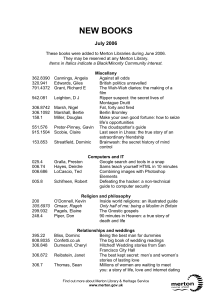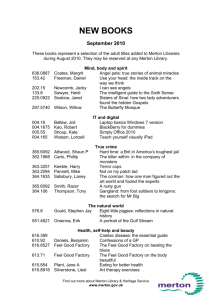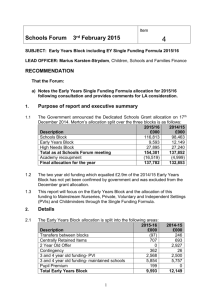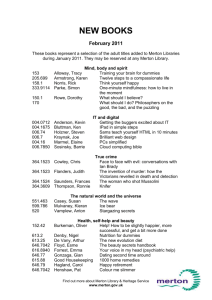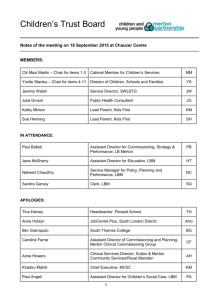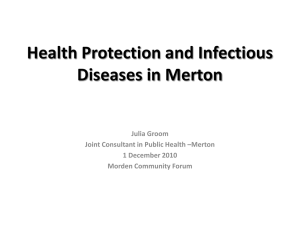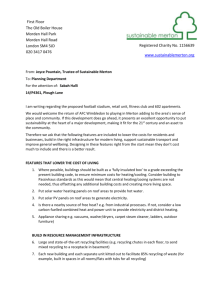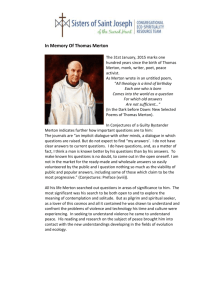SP 2503 Thomas Merton JSTB, Spring 2015
advertisement
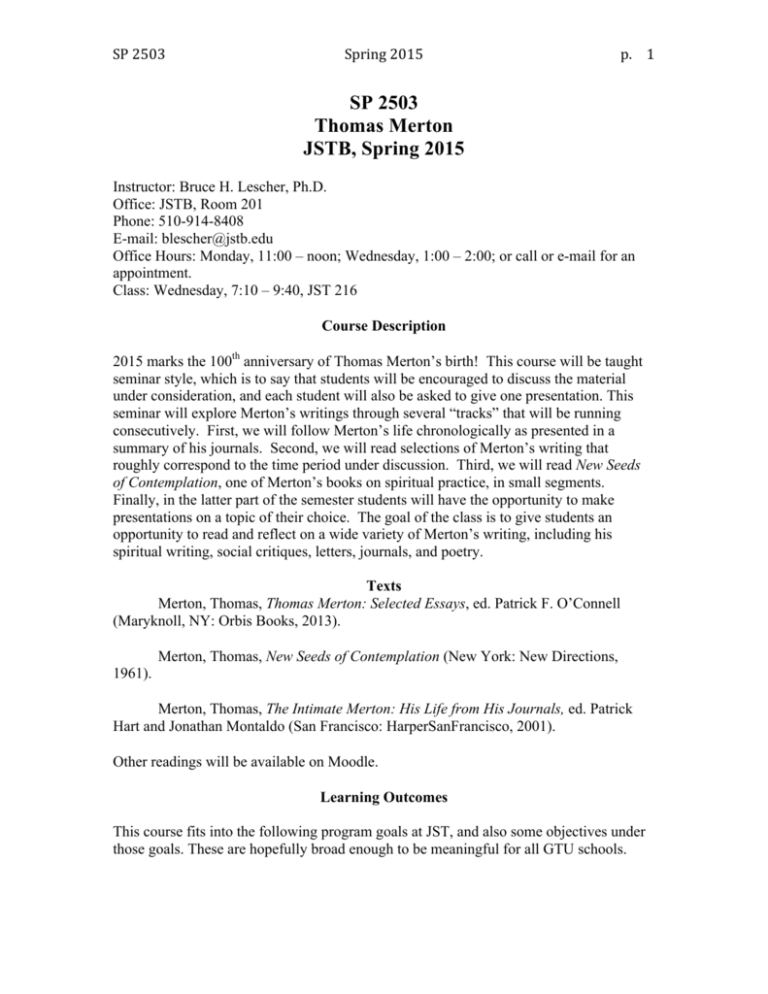
SP 2503 Spring 2015 p. 1 SP 2503 Thomas Merton JSTB, Spring 2015 Instructor: Bruce H. Lescher, Ph.D. Office: JSTB, Room 201 Phone: 510-914-8408 E-mail: blescher@jstb.edu Office Hours: Monday, 11:00 – noon; Wednesday, 1:00 – 2:00; or call or e-mail for an appointment. Class: Wednesday, 7:10 – 9:40, JST 216 Course Description 2015 marks the 100th anniversary of Thomas Merton’s birth! This course will be taught seminar style, which is to say that students will be encouraged to discuss the material under consideration, and each student will also be asked to give one presentation. This seminar will explore Merton’s writings through several “tracks” that will be running consecutively. First, we will follow Merton’s life chronologically as presented in a summary of his journals. Second, we will read selections of Merton’s writing that roughly correspond to the time period under discussion. Third, we will read New Seeds of Contemplation, one of Merton’s books on spiritual practice, in small segments. Finally, in the latter part of the semester students will have the opportunity to make presentations on a topic of their choice. The goal of the class is to give students an opportunity to read and reflect on a wide variety of Merton’s writing, including his spiritual writing, social critiques, letters, journals, and poetry. Texts Merton, Thomas, Thomas Merton: Selected Essays, ed. Patrick F. O’Connell (Maryknoll, NY: Orbis Books, 2013). Merton, Thomas, New Seeds of Contemplation (New York: New Directions, 1961). Merton, Thomas, The Intimate Merton: His Life from His Journals, ed. Patrick Hart and Jonathan Montaldo (San Francisco: HarperSanFrancisco, 2001). Other readings will be available on Moodle. Learning Outcomes This course fits into the following program goals at JST, and also some objectives under those goals. These are hopefully broad enough to be meaningful for all GTU schools. SP 2503 Spring 2015 p. 2 Goal: Students will develop a critical fidelity to the christian tradition, in service of the faith that does justice. Objectives: • Students will employ historically and philosophically informed knowledge of the tradition in assessing theological positions. For this class: o Comment on Merton’s writings by understanding some of the theological issues that shaped his context (especially, the rebirth of monastic theology). o Discuss their own appropriation of Merton’s insights insofar as they relate to the student’s religious context. • Students will integrate the perspective of the poor and the marginalized in their reflection on theological and pastoral issues. For this class: o Discuss Merton’s social commentaries, particularly as they relate to nuclear war, nonviolence, and racism. o Consider how his concerns translate into the contemporary context. Goal: Students will recognize the interplay between faith and culture in addressing theological and/or pastoral issues that emerge in diverse cultural contexts. Objective: • Students will locate theological and pastoral issues in the cultural contexts in which they emerge. For this class this relates to two cultural contexts: o The post World War I era out of Merton’s youth. o The 1950’s and 60’s; the time of his maturity. More specifically, at the end of the course the student will be able to: • Describe orally and in writing the stages of development in Merton’s life. • Identify, describe, and analyze some of the major theme’s in Merton’s writing: being a monk and a writer, the true self, solitude and community, contemplation, the role of the monk, racial injustice, peace and non-violence, interreligious dialogue. • Become especially conversant on aspect of Merton’s writing, chosen by the student. • Articulate the relevance of Merton’s writing for one’s own spirituality and ministry. Accountability 1. Attending class and participating in discussions. 2. Doing the readings listed for each class; readings are due on the day they are listed. SP 2503 Spring 2015 p. 3 3. Using Moodle, post at least one comment each week on the discussion board. On a rotating basis, one student will post a question, and the others in the discussion group will post replies. This will begin the second week of the semester. 4. Writing three four-page papers; these will be due on February 25, March 18, and April 15. Suggested topics will be handed out a week ahead of time. 5. Making one presentation in class. Depending on people’s interests, this may be done either individually or in a small group. Dates: April 29, May 6 and 13. More information to follow. 6. Handing in a final paper (10-15 pages) based on your presentation. Due on May 22. Important If you have a learning disability or some other physical condition which requires special arrangements for classroom seating or written assignments, please inform me early in the semester so that these arrangements can be worked out. Schedule February 4 – Introduction. Merton: background, overview, early life. Prior to class read Shannon, Silent Lamp, 26-77, posted on Moodle. February 11 - Merton: Exploring the monastic vocation Reading: Section of Seven Story Mountain [Cunningham, Spiritual Master, 63-107], posted on Moodle; Hart and Montaldo, 1-44; Essays, 3-14; New Seeds 1-13. February 18 - Merton: Becoming a monk and writer For this class, write down and turn in a topic that you are considering for your presentation and final paper. Suggestions for Paper 1 to be handed out in class. Reading: Hart and Montaldo, 45-102 [89-102 is his essay “Fire Watch”]; Selected Essays 15-22, 23-38, and 65-85; New Seeds 14-51. February 25 - Merton: Pursuing the monk’s true life Paper 1 due Reading: Hart and Montaldo, 103-154; Selected Essays 52-64, 150-171, 225-231; New Seeds 52-79. March 4 – Merton as cultural critic. Reading: Selected Essays 39-51, 86-101, 113-125, 240-257, 258-276; New Seeds 80-103. SP 2503 Spring 2015 p. 4 March 11 - Merton: Pivotal Years, Cold War Writings Suggestions for Paper 2 to be handed out Reading: Hart and Montaldo, 155-209; four essays on Moodle: L.C. McHugh, “Ethics at the Shelter Doorway”; Merton, “The Shelter Ethic,” “Target Equals City,” and “Religion and the Bomb”; Selected Essays 126-149, 177-184, 284-295; New Seeds 104-125. March 18 - Merton: Seeking peace in the hermitage. Paper 2 due Reading: Hart and Montaldo, 211-267; “The Wisdom of the Desert” (Moodle); Selected Essays 216-224, 232-239, 382-400, 452-462; New Seeds 126-149. March 25 - no class; Spring break April 1 - Merton: Exploring Solitude and Freedom Reading: Hart and Montaldo, 269-313; Michael Mott, “Mount Olivet” (Moodle); Doug Burton-Christie, “Rediscovering Love’s World: Thomas Merton’s Love Poems and the Language of Ecstasy” (Moodle); Merton, “Hagia Sophia,” (Moodle); New Seeds 150175. April 8 - Merton on Racism in the United States Suggestions for Paper 3 to be handed out Reading: “The Hot Summer of Sixty-Seven,” in Faith and Violence (Moodle); Selected Essays 205-215, 296-309, 426-432; New Seeds 176-198. April 15 - Merton on Contemplation, some poems Paper 3 due. Reading: “The Inner Experience” [Cunningham, Spiritual Master, 294-356] (Moodle); selection of poems (Moodle); New Seeds 239-274. April 22 - Merton: End of the Journey, Religions of the World Reading: Hart and Montaldo, 313-363; Selected Essays 102-112, 342-360; Letters to Abdul Aziz, 43-67, Dona Luisa Coomaraswamy, 125-133, and Abraham Heschel, 430436, in Hidden Ground of Love (Moodle); New Seeds 275-297. April 29 - Class presentations May 6 - Class presentations May 13 - Class presentations, wrap up May 20 – No class, work on final paper May 22 – Final paper due
